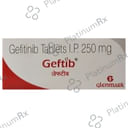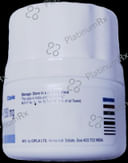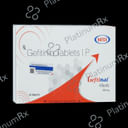Gefitinib
Uses
Gefitinib Uses Gefitinib is used in the treatment of non-small cell lung cancer. It is indicated for patients whose cancer has spread to other parts of the body, who have abnormal epidermal growth factor receptor (EGFR) genes, and who have not received prior treatment for cancer.
How it Works
How Gefitinib works Gefitinib is an anti-cancer medication that functions by inhibiting the action of the abnormal protein responsible for signaling cancer cells to multiply. This mechanism helps to stop or slow the spread of cancer cells.
Side Effects
Common side effects of Gefitinib include diarrhea, nausea, stomatitis (inflammation of the mouth), vomiting, weakness, decreased appetite, fever, hair loss, conjunctivitis, eyelid inflammation, hemorrhage, interstitial lung disease, dryness of the mouth, angioedema (swelling of deeper layers of skin), and urticaria.
Expert Advice
- Gefitinib is used to treat non-small cell lung cancer that is locally advanced or has metastasized to other areas of the body.
- Take it with or without food, preferably at the same time each day.
- Do not take antacids (to reduce stomach acid) 2 hours before or 1 hour after taking this medication.
- Diarrhea may occur as a side effect; drink plenty of fluids and inform your doctor if it persists or if you notice blood in your stools.
- Use a reliable contraceptive method to prevent pregnancy while taking this medication and for one month after discontinuation.
- Inform your doctor if you develop mouth ulceration, experience changes in vision, or have a worsening cough, shortness of breath, or breathing difficulties while on this medication.
- Your doctor may require regular blood tests to monitor liver function during treatment.
Related Medications
Gefitinib 250mg

₹6,500

₹1,380
MRP ₹2,760
Gefitinib 250mg

₹4,250

₹1,380
MRP ₹2,760
Gefitinib 250mg

₹10,200

₹1,380
MRP ₹2,760
Gefitinib 250mg

₹7,672.8

₹1,380
MRP ₹2,760
Gefitinib 250mg

₹2,139.6

₹1,380
MRP ₹2,760
Gefitinib 250mg

₹4,175.6

₹1,380
MRP ₹2,760
Gefitinib 250mg

₹4,500

₹1,380
MRP ₹2,760
Gefitinib 250mg

₹4,150

₹1,380
MRP ₹2,760
Gefitinib 250mg

₹3,388.8

₹1,380
MRP ₹2,760
Gefitinib 250mg

₹5,900

₹1,380
MRP ₹2,760
Gefitinib 250mg

₹1,380
MRP ₹2,760
Gefitinib 250mg

₹3,499

₹1,380
MRP ₹2,760
Gefitinib 250mg

₹1,436

₹1,380
MRP ₹2,760
Gefitinib 250mg

₹3,400

₹1,380
MRP ₹2,760
Gefitinib 250mg

₹4,374.1

₹1,380
MRP ₹2,760
Gefitinib 250mg

₹2,940

₹1,380
MRP ₹2,760
Gefitinib 250mg

₹4,170

₹1,380
MRP ₹2,760
Gefitinib 250mg
₹3,420

₹1,380
MRP ₹2,760
Gefitinib 250mg

₹2,009.2

₹1,380
MRP ₹2,760
Gefitinib 250mg

₹5,500

₹1,380
MRP ₹2,760
Gefitinib 250mg

₹3,598.3

₹1,380
MRP ₹2,760
Gefitinib 250mg

₹2,655

₹1,380
MRP ₹2,760
Gefitinib 250mg

₹1,536

₹1,380
MRP ₹2,760
Gefitinib 250mg

₹5,531.3

₹1,380
MRP ₹2,760
Gefitinib 250mg

₹13,208.1

₹1,380
MRP ₹2,760
Flat ₹100 off on first app order | Use Code: APP100 |
Flat ₹100 off on first app order
USE CODE: APP100

Download Now